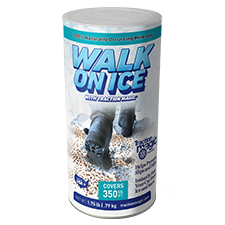Asphalt Vs Concrete For Driveway? Here’s The Winner

Your driveway can change the whole look of your property and boost its curb appeal. But when you are planning to install a driveway, you probably find yourself in a fixed situation between concrete and asphalt, the most common material for driveways. Moreover, you also worry about the upkeep of your driveway and which ice melt is better for concrete and asphalt.
It Would Be Best If You Studied The Following Factors To Understand The Suitable Material For Your Concrete Driveway.
- Cost
Generally, an asphalt driveway is cheaper than concrete, costing $2.00 to $4.00 per square foot. However, its prices tend to fluctuate with crude oil prices, whereas a basic concrete driveway costs between $4.00 and $6.00 per square foot. However, colors, finishes, and stains can increase the price to $15.00 per square foot.
- Maintenance
An Asphalt driveway must be resealed every 3 -5 years to maintain its long life. However, a concrete driveway does not require so much sealing. Degreasers may increase the maintenance cost for concrete driveways. However, removing oil, fuel, and chemical stains that appear over time is sometimes necessary.

- Lifespan
Asphalt can last 30 years, while a concrete driveway can last up to 50 years with proper maintenance and care.
- Aesthetic and Design
If you are looking for an aesthetic and designed driveway to enhance your property’s curb appeal, concrete will be the right choice because you can apply colors, finish, stain, or stamp your concrete driveway. While asphalt has to be rolled and compressed during installation; hence does not lend well to spend, stamp or stain.
- Climate and Weather
In colder regions, during winter, your concrete can crack during the freezing and thawing cycle. Salt and chloride-based ice melts can cause profound harm and result in spalling and scaling the concrete if you don’t know what ice melt to use on concrete. On the other hand, the hot sun in summer can melt the asphalt and make it sticky to shows and car tires.
Which Ice Melt Is Better For Concrete?
Protecting your concrete driveway from harmful substances is very important for its longevity, and this thought raises a challenge in deciding what ice melt to use on concrete driveways. Concrete absorbs water like a sponge. Thus deicing products that contain Salt and Chloride should be avoided as it can cause serious harm to your concrete and steel reinforcement resulting in corrosion, cracks, spalling, and scaling.
What Ice Melt To Use On Concrete? The Safest Option Is Safe Thaw
Safe Thaw is a urea-based ice melt that melts ice faster without leaving any harmful substance behind and does not allow the brine to reform the ice inside concrete capillaries. It is non-corrosive and non-conductive, thus safe for your concrete and steel reinforcement. It is a natural formula that does not harm your vehicles, interior flooring, metal, and vegetation while giving a longer life to your concrete driveways.
100% salt & chloride-free, fast acting Ice Management Solution
Conclusion
Concrete is a better option for house owners as it gives more choice of design and is cost-effective in the long term, and is easy to maintain even in ice and snowy weather by choosing the right ice melt product.
Try Also Our Other Winter Safety Products:
Safe Paw
The Original and #1 Selling Pet and Child Safe Ice Melt for over 20 years. Guaranteed environmentally safe –It won’t harm animals or children, and it won’t damage your property. That’s Safe Paw. Safe Paw can change how winter affects our planet.

Walk On Ice
The handy disposable canister can be taken everywhere, with the same 100% naturally occurring minerals that provide instant traction on ice or snow. Use it on sidewalks, steps, or as an instant traction agent for your car.


